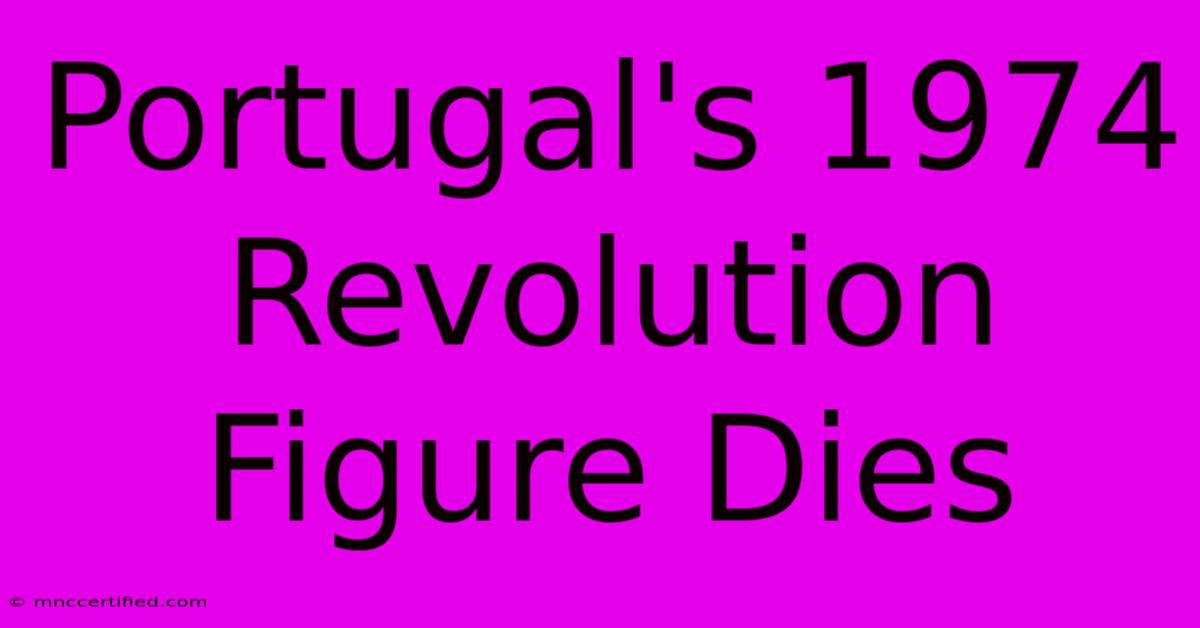Portugal's 1974 Revolution Figure Dies

Table of Contents
Portugal's 1974 Revolution Figure Dies: Remembering Salário
The Passing of a Key Figure in the Carnation Revolution
On [Insert Date of Death], Portugal mourned the passing of [Insert Name of Figure], a prominent figure in the transformative Carnation Revolution of 1974. His death marks the end of an era, prompting reflection on his significant role in shaping modern Portugal. This article will explore his life, his contributions to the revolution, and his lasting legacy.
The Carnation Revolution: A Brief Overview
Before delving into [Insert Name of Figure]'s life, it's crucial to understand the context of the Carnation Revolution. This pivotal moment in Portuguese history, occurring on April 25th, 1974, overthrew the Estado Novo dictatorship, a right-wing authoritarian regime that had ruled Portugal for nearly 50 years. The revolution, largely bloodless, was spearheaded by the Armed Forces Movement (MFA), a group of progressive military officers who sought to establish a democratic Portugal.
The revolution was named after the carnations that protestors placed in the barrels of soldiers' rifles, symbolizing a peaceful transition to democracy. This peaceful nature, however, didn't negate the deep-seated political and social upheaval that followed. The years immediately following the revolution were marked by significant social and political restructuring, including land reform, nationalization of industries, and a move towards a multi-party democracy.
[Insert Name of Figure]'s Role in the Revolution
[Insert Name of Figure] played a [Describe Role: e.g., crucial, pivotal, significant] role in the Carnation Revolution. [He/She] was a [Insert Profession/Rank: e.g., military officer, politician, journalist] who [Explain Specific Actions and Contributions: e.g., helped plan the coup, played a key role in negotiations with the government, advocated for specific social reforms].
Specifically, [Insert Name of Figure]'s involvement in [Mention a specific event or action] significantly impacted [Explain the impact: e.g., the negotiations with the outgoing regime, the implementation of land reform policies, the establishment of democratic institutions]. His/Her [mention key characteristic, e.g., unwavering commitment to democratic principles, strategic political maneuvering, deep understanding of social inequalities] were instrumental in shaping the outcome of the revolution and its subsequent trajectory.
Key Contributions and Beliefs
[Insert Name of Figure]'s political philosophy was rooted in [Explain their political beliefs: e.g., socialist ideals, democratic principles, commitment to social justice]. [He/She] believed in [Explain key political beliefs and how they influenced actions during the revolution: e.g., the importance of land reform for economic equality, the necessity of a democratic system for social progress, the value of peaceful resistance]. This is evidenced by [cite specific examples or quotes].
Legacy and Lasting Impact
The death of [Insert Name of Figure] prompts a reassessment of his legacy. While [Mention any controversies or criticisms: e.g., some criticize his actions in relation to X, some historians debate his role in Y], his contributions to the establishment of democratic Portugal remain undeniable. His impact can be seen in [Mention specific lasting impacts: e.g., current land ownership policies, the structure of Portugal's political system, the ongoing efforts for social justice].
[Insert Name of Figure]'s life and work serve as a reminder of the sacrifices and struggles involved in the fight for democracy and social justice. His story will continue to be studied and debated as Portugal reflects on its past and charts its future.
Conclusion: Remembering a Revolutionary
The passing of [Insert Name of Figure] is a significant loss for Portugal. His contributions to the Carnation Revolution and the subsequent development of Portuguese democracy will continue to inspire future generations. Understanding his role in this defining moment in Portuguese history is essential for comprehending the country's present and shaping its future.
Keywords: Carnation Revolution, Portugal, 1974 Revolution, [Insert Name of Figure], Portuguese History, Democracy, Dictatorship, Estado Novo, MFA, Armed Forces Movement, Social Reform, Land Reform, [Add other relevant keywords related to the figure’s life and work]
Note: Remember to replace the bracketed information with the relevant details about the deceased figure. Thorough research is crucial for accuracy and to ensure the article is well-informed and factual. This framework can be adapted to fit any prominent figure involved in the Carnation Revolution.

Thank you for visiting our website wich cover about Portugal's 1974 Revolution Figure Dies. We hope the information provided has been useful to you. Feel free to contact us if you have any questions or need further assistance. See you next time and dont miss to bookmark.
Featured Posts
-
Robert F Kennedy Jrs 5 Health Stances
Nov 16, 2024
-
Landman A Taylor Sheridan Appraisal
Nov 16, 2024
-
Milford Casualty Insurance Company
Nov 16, 2024
-
Scotland Vs Croatia Free Online Game
Nov 16, 2024
-
Ireland Vs Argentina Player Ratings And Ruck Analysis
Nov 16, 2024